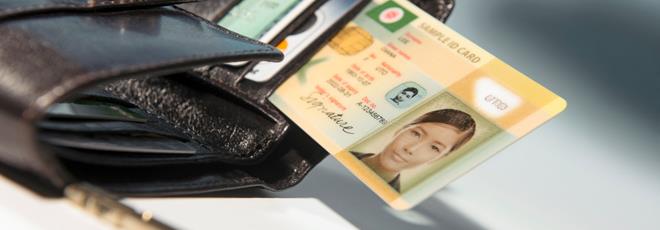whether entitled to social security benefits and a multitude of other attributes. Since this common database will be accessible to all regulatory agencies, in different views, it will be difficult for any one cartel or criminal group to access it and change ALL entries related to an individual. Thus the transport bureau can have access only to the Name, Age, and whether allowed to drive fields, past driving violations cells in the table, and not have access to other data. The immigration office can have access to other data like whether in the country or out of the country, when arrived and left, passport validity, etc.
RFID National Identification
- Home
- Pages

RFID Solution Of National Identification:
A user typically has only a single card with an embedded RFID chip with a unique number. This RFID tag number then points to an online database which is accessed by a multitude of agencies. The same database can have all information related to the holder, including details like date of birth, whether allowed to drive (electronic driving permit),
Present Situation Of National Identification:
- A citizen carries a multitude of ID cards, which can be for various purposes and issued by multiple agencies.
- For example, a single adult bonafide citizen may have a social security card, national ID card, passport, voter card, driving license, etc.
- The cards are prone to illegal copying, skimming, identity theft, and other ills. The magnitude of this problem is huge, The resources to hunt and track down fake cardholders are too less to solve the problem.
- The fake card problem is a recurring one, growing by the day. It has now become a national security issue.
Advantages Of RFID Solution
- A single ID card needs to be issued. No need to issue multiple documents and cards to the same person.
- A secret serial number (encrypted) on the card connects it to the right database entry. No way to duplicate or forge this. A single fake document can no longer be used to generate other perfectly legal documents.
- For example today many criminals start with one fake document (say a Social Security ID card) and using that as the identifier, apply and get other perfectly legal documents like passports, driving licenses, and the like. This will not be possible in an RFID-based system.
- Instant snapshot data of the population. No need to painstakingly conduct surveys or mine data on demographics, population behavior, age profiles, etc. This is especially useful for governments to plan their spending.
Actual Implementations
The biggest RFID card project implementation is going to be in China, where the plastic ID cards issued to Chinese citizens will be replaced by RFID cards. This may be one of the world’s biggest RFID projects since the Chinese population today stands at I billion and every man, woman, and child will have to be issued one individual card.
The estimated value of the project is about 6 billion dollars, truly a large project. Interestingly, the Chinese are not talking about read-only cards and a central database. They are thinking about ID cards with read-write capability, biometric information, as well as a magnetic stripe that older card readers can also read. The read/write functionality will be used mostly by police and civic authorities to update information like residential addresses or telephone numbers.
Future Scenarios Of National Identification
In the future, most national governments may employ such a card to distinguish between real & fake citizens, monitor compliance with laws, and even track movements. This may be a too big temptation for any nondemocratic government to resist. This in turn will lead to a stiff fight between privacy advocates & political opponents on one side and security personnel & the ruling establishment on the other side.
- RFID Fixed Asset Management
- RFID Anti-Theft Systems
- RFID Jewellery Tracking System
- RFID Untouched Attendance
- RFID Warehouse Management
- RFID Animal Identification
- RFID Vehicle Identification
- RFID ETC(Electronic Toll Collection) Solution
- RFID Laundry Management
- RFID Student/Parent Auto Voice Calling at School
- RFID Royalty Customers Deals at Shopping Malls
- RFID Document Management
- RFID Anesthetic Dosages
- RFID Baggage Handling
- RFID People & Personnel Tracking
- RFID Blood Banks
- RFID Car manufacturing
- RFID Drug Pedigree
- RFID Event Management
- RFID Race Solution Sports Events
- RFID Food Safety
- RFID National Identification
- RFID Gasoline Dispensing
- RFID Hotels & Resorts
- RFID Work in Progress Tracking
- RFID Hospital Stores Management
- RFID Medical Surgeries
- RFID Based Patient Location Confirmation
- RFID Body Temperature Monitoring System
- RFID Body Temperature Monitoring for Employees
- RFID Mother Baby Pairing
- RFID Museums
- RFID Spool Tracking System
- RFID Plane Spare Parts
- RFID Industry 4.0 Smart Manufacturing
- RFID Container Tracking System
- RFID Intelligent RFID Parking System
- RFID Office Printers & Cartridges
- Real Time Location Tracking (RTLS)
- RFID Retailing
- RFID Underground Sewers
- RFID Forklift Automation
- RFID Sales Staff Tracking at Shopping Malls
- RFID Trial Room Analytics at Shopping Malls
- RFID Traffic Management
- RFID Guard Patrolling System
- RFID Weightbridge Automation System
- RFID E-Lock for Contrainers
- RFID E-Seal for Contrainers
- RFID Waste Management
- RFID Yard Management

Can we help you?

